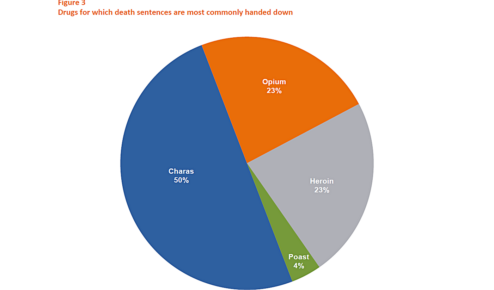Over twenty years after its promulgation, the Control of Narcotic Substances Act (CNSA) 1997 is in urgent need of reform. Under the CNSA, Pakistan’s drug enforcement system is geared towards seizing individual consignments of illicit drugs and handing down the harshest possible punishments for couriers, failing to investigate and disrupt organized drug trafficking networks. The human consequence is that the bulk of those convicted under the CNSA belong to low-income households, often the most economically and socially vulnerable class, whereas drug kingpins go scot-free.
In view thereof, the Foundation for Fundamental Rights conducted a qualitative and quantitative analysis of 133 cases drawn from eight Pakistani prisons in which the alleged drug offenders had been charged with capital drug crimes under the CNSA and compiled its findings and recommendations for reform in its report, Optimising Pakistan’s Drug Law.
Download the Report here: Optimising Pakistan’s Drug Law – A Report by FFR
The report reveals that:
- In 29% of cases, prisoners identified at least one senior trafficker to law enforcement authorities. However, in only 1% of cases, the senior trafficker was charged or arrested.
- Of the 133 cases, there was no instance in which law enforcement authorities encouraged drug couriers to become cooperating witnesses who might offer vital information on senior traffickers in exchange for leniency in sentencing.
- In 50% of the cases, death sentences were handed down to those involved in smuggling of class B or class C drugs such as charas or bhang.
- 100% of all capital charges were brought for primarily possession-based offences. In 73% of these cases, the person found in possession of the narcotics was also involved in the offence of transporting them and in 15% of the cases, the prisoner could arguably be accused of exporting narcotics (having been arrested while attempting to leave the country).
- In 76% of capital cases tried under the CNSA regime, there was not a single case in which the court took into account testimony from an independent witness i.e. a person not directly employed by the Anti-Narcotics Force or another law enforcement agency).
The Report further notes that the current regime under the CNSA does not distinguish between the types of drugs and serves punishments on offenders solely based on the quantity of the drug, dismissing other factors such as its commercial value or harmfulness. The flaws in the sentencing system are further exacerbated by an absence of consideration of aggravating or mitigating circumstances, leading to perverse sentencing practices.
The Foundation for Fundamental Rights recommends a reworking of CNSA’s sentencing framework, specifically to reflect sentencing proportionate to the severity of the offence committed and consider aggravating and mitigating circumstances. Moreover, the CNSA regime be reworked to prioritise the disruption and dismantling of organized drug trafficking networks and end seizure-based sentencing. In order to improve standards of justice in the CNSA courts, it is also imperative to strengthen the judiciary through capacity building activities.
Download the Report here: Optimising Pakistan’s Drug Law – A Report by FFR
Also see: FFR’s article analyzing the Control of Narcotic Substances Act
The views expressed in this article are those of the authors and do not necessarily represent the views of CourtingTheLaw.com or any organization with which they might be associated.


